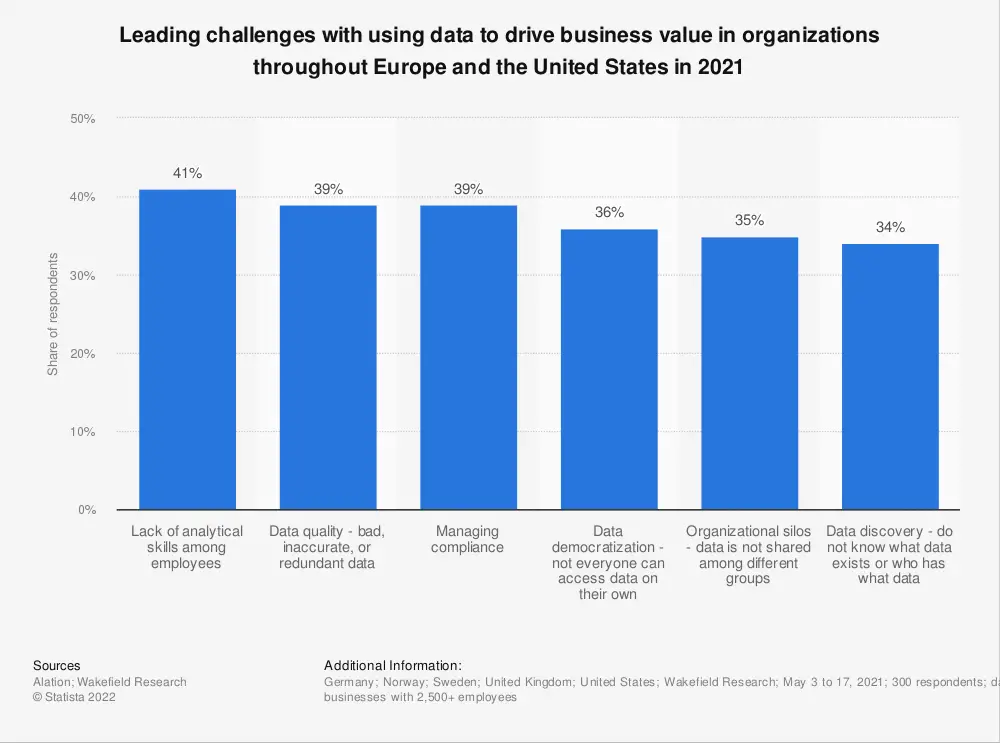Data is a key component of any successful business. By using data, businesses can make educated decisions that will help them grow and succeed. But what do businesses use data for?
Data-Driven Decision-Making
Data can be used to inform decisions that companies make about their operations, products, services, and marketing strategies. Businesses rely on data to identify trends and make predictions about the future.
By understanding customer behavior, companies are able to tailor their offerings in order to best meet their customers’ needs.
For example, a retail company might use data to determine which products are selling well and which ones need improvement or discontinuation. This helps the company focus on its most profitable items while also ensuring its customers are getting the best possible experience.
Analyzing Performance & ROI
Businesses also use data to analyze their performance and measure return on investment (ROI). By collecting and analyzing data from various sources such as financial statements, customer surveys, website analytics, etc., companies can gain insight into how well they’re performing relative to their goals.
Having access to this kind of information allows businesses to adjust their strategies accordingly in order to maximize their investments and ensure they’re meeting their objectives.
Competitive Advantage
Data also helps businesses stay ahead of the competition by providing insights into industry trends and customer preferences so they can be proactive rather than reactive when it comes to developing new products or services.
Companies can also use data from competitors to identify potential weaknesses in their own operations or find opportunities for improvement within the marketplace.
Additionally, by leveraging big data technologies like machine learning or predictive analytics, companies can gain a competitive edge by being able to act faster than those who don’t have access to such tools.
In today’s digital age, having access to accurate and up-to-date data is essential for any business that wants to stay competitive and remain profitable over time. From making informed decisions about operations and product development to measuring performance and staying ahead of the competition, data has become an invaluable resource for businesses of all sizes looking for success in today’s ever-changing world.
With proper utilization of available resources like big data technologies or predictive analytics tools, companies can ensure they’re making smart decisions backed by reliable information that will help them achieve long-term success in whatever industry they may operate in.
How Do Businesses Collect Data?
Accurately collecting data is essential for businesses to understand customer behavior, build consumer loyalty, and make strategic decisions. Collecting data can help identify areas of improvement and form a basis for future marketing campaigns.
Types of Data Collection
There are multiple ways that businesses collect data, including direct methods such as surveys, interviews and focus groups; indirect methods such as web analytics; as well as more advanced techniques like artificial intelligence (AI) and machine learning (ML). Let’s take a look at each of these types in more detail.
Surveys & Interviews: Surveys are one of the most common ways for businesses to collect data about their customers. They allow businesses to gain insights into customer behaviors, opinions, preferences, etc., which can then be used to inform business decisions.
Besides surveys, interviews are also an effective way of collecting qualitative data. By conducting interviews with customers or potential customers directly, a business can gain valuable insights into their target audience and use that information to improve customer experience and satisfaction.
Web Analytics: Web analytics refers to the process of analyzing website performance in order to understand user behavior on the site. This type of data collection helps businesses track website visitors over time in order to understand how they interact with the site and what kind of content resonates best with them. Web analytics can provide invaluable insights into customer preferences and help inform marketing strategies accordingly.
AI & ML: AI and ML are two advanced techniques used by businesses for collecting data automatically from various sources such as websites, social media platforms, mobile apps, etc.
AI-based tools help automate mundane tasks like sentiment analysis and natural language processing while ML-based solutions enable predictive analysis based on previously collected data. These technologies allow businesses to quickly analyze large amounts of data in order to make informed decisions faster than ever before.
Data is essential for any business looking to stay competitive in today’s market. By understanding how customers behave online or what they think about your brand or product offering you can better tailor your services or products toward their needs.
How To Use Business Data To Increase Customer Awareness?
Business data can be an incredibly powerful tool in driving customer awareness. By leveraging the right data, you can create campaigns that are more effective and reach a broader audience. But how do you know which data is the right data?
Analyze Your Customer Profiles
When trying to increase customer awareness, the first step is to analyze your customers’ profiles. This includes gathering insights into their demographics, including age, gender, location, interests, and more. Having a better understanding of who your target customers are will help you tailor your marketing campaigns for maximum impact.
Understand Your Competitors’ Strategies
It’s also important to understand what strategies your competitors are using when it comes to increasing customer awareness. This includes analyzing their content strategy, marketing tactics, and overall goals.
By understanding what strategies they are using and which ones are successful (or not), you can develop new ideas for reaching customers that have not been utilized by your competitors yet.
Harness Technology
Technology is another key factor in leveraging business data to maximize customer awareness. With advances in AI and predictive analytics, companies now have access to powerful tools that can provide deep insights into customer behavior and preferences.
These tools can help you identify potential areas of opportunity where you can focus your efforts in order to reach more potential customers with relevant content or promotions.
Additionally, harnessing technology like automation software can help streamline processes related to launching campaigns as well as tracking performance so you can adjust accordingly if needed.
By utilizing the right business data and leveraging technology such as AI and predictive analytics software, companies can create more effective campaigns that result in increased customer awareness over time.
Additionally, understanding what strategies competitors are using and analyzing customer profiles will provide further insight into how best to reach potential customers with relevant content or promotions that will drive engagement and increase brand loyalty in the long run.
The Benefits Of Using Business Data For Marketing
Business data is a powerful tool when it comes to marketing and understanding your market. It can provide insight into customer behavior, trends in the industry, and what strategies are working.
Having access to this information can help you make better decisions and maximize your return on investment (ROI). Let’s take a closer look at how business data can be used for effective marketing.
Targeted Advertising Campaigns
Business data can be used to create targeted advertising campaigns that are more likely to reach the right audience. This allows you to focus your efforts and resources on people who are more likely to be interested in what you have to offer, which also helps increase ROI. By analyzing customer demographics, interests, buying habits, etc., you can create more personalized ads that will resonate with your target audience.
Data-Driven Content Creation
You can also use business data to inform content creation strategies. By looking at what types of content are performing well in the industry or among customers in general, you can tailor content that appeals to your specific target audience. Additionally, analyzing customer feedback or reviews can give you an idea of what topics they would like to see covered or what types of content they find helpful or interesting.
Competitive Analysis
Another way business data can help with marketing is by providing insight into how competitors are doing in the market. You can analyze which strategies are working for them so that you can adjust your own accordingly—for example, if one competitor is seeing success by offering discounts or promotions during certain times of year, you may want to consider doing something similar as well. This type of analysis gives you an edge over competitors who aren’t taking advantage of available business data and allows you to stay ahead of the curve when it comes to marketing trends and strategies.
Business data is a valuable resource that should not be overlooked when it comes to creating successful marketing campaigns and understanding customer behavior and preferences.
With access to this information, businesses have the power to create more personalized ads that reach their target audiences more effectively, create more relevant content; and gain insight into their competitors’ strategies so they can stay one step ahead.
Leveraging this information will give businesses an edge over their competition and ensure they get the most out of their marketing efforts.
The Limitations Of Using Business Data
Business data can be an invaluable tool for making informed decisions and optimizing operations. As companies become more data-driven, it is essential to understand the limitations of using business data so that you can avoid making costly mistakes.
Data Accuracy and Quality Issues
One of the biggest issues with utilizing business data is accuracy and quality. It is essential to have access to reliable and accurate information in order to make sound decisions.
Unfortunately, many datasets are incomplete or inaccurate due to errors in collection or entry processes. For example, if you are relying on customer feedback surveys, it may be difficult to get a full picture if only a small sample size were surveyed.
Additionally, outdated information can lead to incorrect assumptions or decisions being made based on inaccurate data points.
Another issue related to accuracy and quality is biased in the dataset. Bias can come from sources such as survey participants or employees who have a vested interest in certain results being obtained or reported.
It is important to be aware of potential sources of bias so that steps can be taken to mitigate them before drawing conclusions from datasets.

Data Privacy Issues
Another limitation when using business data is privacy concerns. Companies need to ensure that all customer information collected is securely stored and used appropriately according to applicable laws and regulations such as GDPR and HIPAA in some cases.
Data privacy laws vary by country, so businesses should ensure they are familiar with the relevant legislation before collecting any customer information or utilizing any datasets containing personal information.
It’s also important for companies to clearly communicate their privacy policy with customers so that they know how their personal information will be used and protected by your company at all times.
Conclusion
Businesses use data to increase customer awareness and create a competitive edge. By using business data, you can understand your customers better and target them with relevant content. However, it is important to note that business data has its limitations and should be used in conjunction with other marketing strategies.
References
https://www.businessnewsdaily.com/10625-businesses-collecting-data.html
https://www.gov.uk/government/statistics/uk-business-data-survey-2021
https://hbr.org/2015/05/customer-data-designing-for-transparency-and-trust

